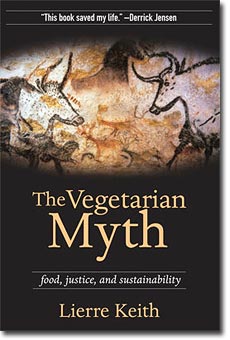I didn't know Lierre Keith's "The Vegetarian
Myth" was a bestseller and underground classic of sorts. I only read one
third of the book, and skimmed the rest. I can't judge the nutritional advice.
However, I think it's obvious that the vegan diet is a Western, middle class
luxury, complete with nutritional supplements. These were not available to our
Stone Age ancestors, or to poor people in the Third World. There's a reason why
most humans are omnivorous, or why vegetarian groups within Hinduism usually
aren't vegan...
I remember the vegan craze of the 1990's. So does Keith, who was a militant vegan herself for twenty years (from the age of 16 to the age of 36). Personally, I found the vegans to be confused, utopian and naïve. Keith paints a more disturbing picture, describing veganism as "part cult, part eating disorder". She seems to have been a particularly extreme vegan, who developed a degenerative disorder and a long depression due to her particular diet (which is, however, never specified).
The author's story is both tragic and tragicomic. When growing her own food, she at first refused to use fertilizers. Some of them are made of oil, others come from dirty mining operations, and still others are made of animal bones and carcasses. The latter is particularly galling for vegans. But what about keeping chickens or goats, letting them "fertilize" the plants? That's apparently prohibited too, since vegans consider all domesticated animals to be exploited and enslaved! In contrast to more "moderate" vegans, who only care about mammals, birds and perhaps fish, Keith was also worried about the fate of the snails which ate her vegetables, and finally about the plants themselves. Plants are also alive and have some kind of consciousness. Is it really right to domesticate tomatoes? Or to eat fruit? At one point, the author therefore investigated the absurd teachings of the "breatharians", who claim to live on pure air (you heard me). Eventually, she relented and bought those chickens.
The anecdotes dealing with Keith's vegan colleagues are equally bizarre. At one point, Keith describes meeting a collective of vegan hippies, who looked like starving people in some poor Third World nation. The hippies *did* have chicken, horses and goats on their property, thereby breaking the ground rule about not domesticating animals. However, they never took milk from their goats (who were in perfect mint condition, in contrast to the hippies), nor did they use the fowl for fertilizer. Keith never found out what on earth the chickens were really for. At another point, the author ran into another vegan who compromised The Message by keeping chickens, excusing herself with the argument that they are really peaceful animals?! Clue: They are not. Pecking order, anyone? On a vegan message board, Keith encountered a man who wanted to stop animals from killing each other, by building a gigantic fence through the Serengeti, with predators on one side and herbivores on the other. In her book, Keith painstakingly explains that this would kill both groups of animals...
What is the mechanism behind these seemingly pathological behaviours? It seems to be a kind of utopian demand for absolute purity and perfection. Keith was shocked to realize (at the age of 16) that the world is marked by death and destruction. She somehow hoped that her vegan lifestyle, coupled with political activism of a left-wing radical kind, would somehow make it possible for her to avoid being implicated. This is why she even worried about the fate of snails, tomatoes or weeds. There are also hints that some kind of spiritual perspective might have moulded her worldview. In another book, Keith admits hanging around the New Age milieu, and in this book she mentions being warned by a qigong teacher that her vegan diet had made her "qi" disappear (a kind of cosmic energy). When the author finally accepted that death is a natural part of life, this too was connected to some kind of spiritual ideas about the world being filled with animistic creatures that sacrifice themselves on behalf of each other in a never-ending cycle of birth, growth and death.
Here, the story could have ended. Except that it didn't. Keith opposes all forms of agriculture as inherently destructive to the planet, and presumably wants a lifestyle based on hunting, gathering and perhaps horticulture. It turns out that our author is a founding member of Deep Green Resistance (DGR), a group that wants to smash "civilization" by armed struggle and eco-terrorism on a truly massive scale. Sounds familiar? It seems that Keith is still obsessed with purity, perfection and utopia. She has simply replaced one extreme philosophy with another one. In fact, she seems to have inverted her old views. Previously, she wanted to sacrifice herself to save an imperfect world. In her new incarnation, Lierre Keith wants to sacrifice us to destroy an imperfect world.
I'm not sure if that counts as progress.

No comments:
Post a Comment